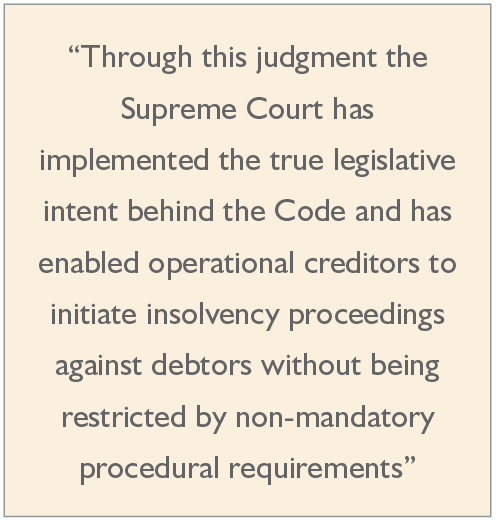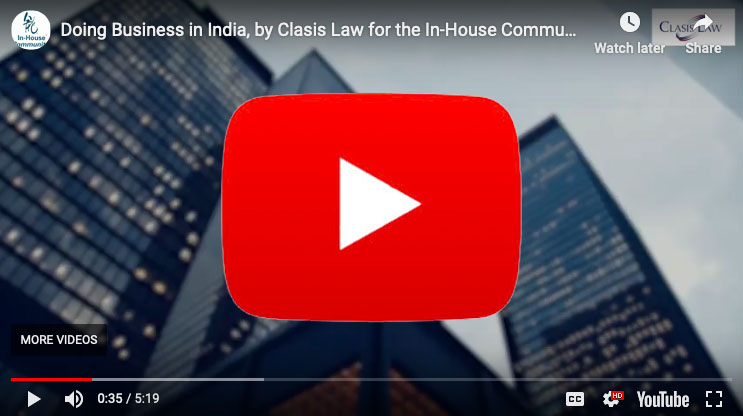 By Mustafa Motiwala and Pragya Nalwa, Clasis Law
By Mustafa Motiwala and Pragya Nalwa, Clasis Law
E: mustafa.motiwala@clasislaw.com,
Clasis Law recently represented Macquarie Bank in two civil appeals before the Supreme Court of India in the connected matters of Macquarie Bank Limited Vs Uttam Galva Metallics Limited and Macquarie Bank Limited Vs Shilpi Cable Technologies Limited, where a bench comprising of Justice RF Nariman and Justice Navin Sinha passed a judgment dated December 15, 2017 and held as under:
- The filing of the certificate under Section 9 (3) (c) of the Insolvency and Bankruptcy Code, 2016 (the Code) is a procedural requirement and directory in nature; and
- The demand notices issued by the advocates under Section 8 of the Code are valid and in order.
To provide a brief background, Section 9 (3) (c) of the Code envisages that along with an application to initiate insolvency proceedings under Section 9 of the Code against the corporate debtor, the operational creditor shall file a certificate from the financial institution maintaining accounts of the operational creditor confirming that there is no payment of an unpaid operational debt by the corporate debtor. The Code states that this certificate has to be issued by a financial institution as defined under Section 3 (14) of the Code, which includes a scheduled bank, a financial institution as defined under Section 45-I of the Reserve Bank of India Act, 1934, a public financial institution as defined in Clause 72 of Section 2 of the Companies Act, 2013 and any such other institution as the central government may by notification specify as a financial institution.
In the abovementioned matters, Macquarie Bank had filed applications under Section 9 of the Code before the National Company Law Tribunal to initiate insolvency proceedings against Uttam Galva Metallics and Shilpi Cable Technologies. Macquarie Bank, being a foreign bank and not having an account with any financial institution as defined above, filed its own certificates under Section 9 (3) (c) of the Code, which reflected that no payment from the debtors had been received.

In subsequent appeals before the National Company Law Appellate Tribunal (NCLAT) filed by the parties, the NCLAT held as under:
- That Macquarie Bank was not a financial institution within the meaning of the Code and thus the certificate filed by it is not in terms of the requirement under Section 9 (3) (c) of the Code. The said requirement being mandatory in nature, an application in absence of the certificate is not maintainable and as such deserves to be dismissed; and
- That the advocate/lawyer, a chartered accountant or a company secretary or any other person in absence of any authority by the operational creditor and since such person do not hold any position with or in relation to the operational creditor, cannot issue the demand notice under Section 8 of the Code.
In relation to the point (a) above, the NCLAT relied upon its order passed in the case of Smart Timing Steel Limited Vs National Steel and Agro Industries Limited and upheld that the requirement of filing a certificate under Section 9 (3) (c) of the Code is a mandatory requirement.
In the civil appeals against these orders of the NCLAT, the Supreme Court has settled the legal position and has held that the filing of certificate under Section 9 (3) (c) of the Code is not a pre-requisite to trigger insolvency proceedings under the Code. The Court has held that the filing of the certificate under Section 9 (3) (c) of the Code is a procedural requirement and is directory in nature. The Court has further held that the demand notices filed by advocates under Section 8 of the Code are valid and in order.
Through this judgment the Supreme Court has implemented the true legislative intent behind the Code and has enabled the operational creditors, especially the foreign operational creditors, to initiate insolvency proceedings against their debtors without being restricted by the procedural requirements that are not mandatory in nature. This judgment is, thus, a huge respite, especially for the foreign operational creditors, who do not have an account with a financial institution within the meaning of the Code, as now they are not restricted by the said requirement to initiate insolvency proceedings under the Code.
E: mustafa.motiwala@clasislaw.com
T: (91) 11 4213 0000
F: (91) 11 4213 0099


































 Clasis Law
Clasis Law Mustafa Motiwala
Mustafa Motiwala Vineet Aneja
Vineet Aneja




